Reverse osmosis water is one of the best ways to purify your drinking water supply, however, it usually removes the naturally-occurring healthy minerals found in water. Luckily, there are simple ways to add those healthy minerals back into your diet! Let’s dive into the best mineral drops for reverse osmosis water. Are they really necessary? What are the best brands? Why do we need minerals? Are there dangerous trace mineral supplements on the market?
Keep reading to learn more (you might be surprised by these answers)!
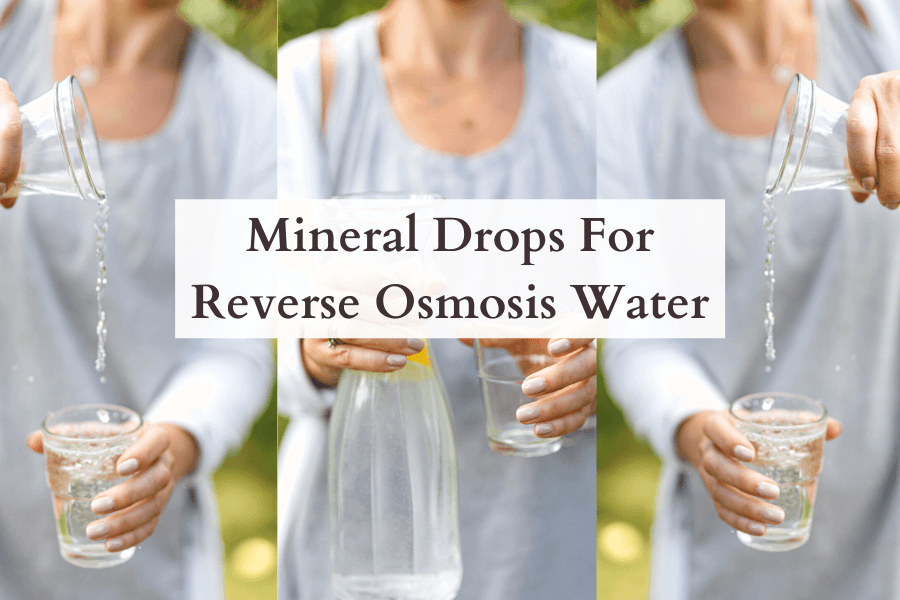
Note: This article contains affiliate links, meaning In On Around will make a small commission at no additional cost to you. This helps me maintain the site. As always, I value full transparency & only work with brands I love and trust.
What’s The Difference Between Vitamins & Minerals?
Vitamins and minerals are oftentimes mentioned together since they’re both micronutrients, however, they are distinct and different compounds. Vitamins are made by plants or animals as “organic” compounds. Minerals, on the other hand, come from soil, rock, and water (as “inorganic” compounds). Our bodies do not create these substances on our own – we need to get them from an external source.
There are thirteen essential vitamins, which are all absolutely necessary for proper bodily function. On the contrary, there are several thousand species of minerals (over 4,000), all of which are not necessary for our bodies to function.
Iodine deficiency affects about 1/3 of the world’s population. [11]
Why Do We Need Minerals?
Mineral deficiencies can lead to a host of health issues such as:
- Weak bones [1]
- Fatigue or weakness [2, 3]
- Weakened immune system [4]
- Stunted growth [5]
- Digestive issues, like diarrhea, constipation, bloating, nausea, and stomach pain [6]
- Muscle cramping [7]
- Neurological symptoms, like poor concentration, and slow mental development [8]
- Lack of appetite [9]
- Vision or eyesight issues, like Macular Degeneration [10]
As always, the severity of these symptoms can vary from person to person. Calcium, zinc, iron, magnesium, iodine, and potassium deficiencies are especially common.
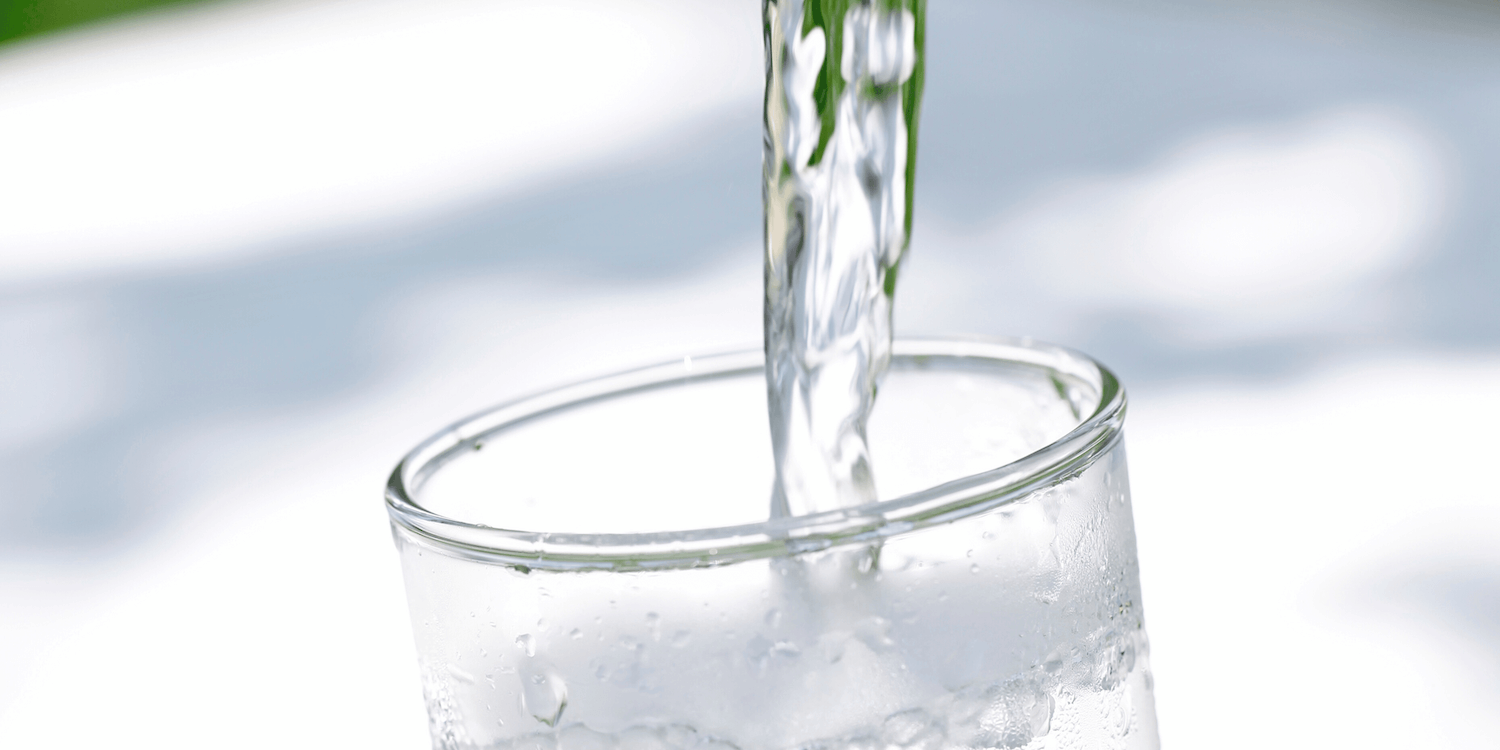
What Causes Mineral Deficiencies?
A poor diet (one that’s full of processed junk food) is oftentimes mineral-deficient. Very restricted diets, such as keto or veganism, can also lead to significant mineral deficiencies. If your body struggles to properly digest food (like due to leaky gut, parasitic infections, food intolerances, etc…), you can also be deficient in minerals. Even certain medications can impact your absorption!
If you’re experiencing symptoms of a mineral deficiency, speak to your doctor (especially a naturopathic doctor) who can run proper bloodwork panels to test your mineral levels. Many of these symptoms can also indicate a more serious health condition (especially if you’re having trouble absorbing minerals).
Do You Need Minerals For Proper Hydration?
Yes, you need minerals for proper hydration. Dehydration is an imbalance of water and minerals, such as sodium, potassium, calcium, magnesium, and other trace minerals. If you’re not properly hydrated, you can experience serious health issues like dizziness and fainting.
Do Reverse Osmosis Water Filters Remove Minerals?
Yes, typically reverse osmosis (RO) filters remove the natural minerals found in the water. Reverse osmosis water filters are extremely high-quality filters and they remove potentially harmful contaminants, like bacteria, heavy metals, and chlorine. However, they oftentimes also remove some of the healthy naturally-occurring minerals in the liquid.
Minerals also give water a specific taste, so adding them back in can make the water taste better (although this is very subjective).
If you want to learn more about why reverse osmosis water filters are a great option, read this article: AquaTru vs. Berkey – What To Look For In A Water Filter or Purifier.
Do We Need Minerals In Our Water?
Many people in the holistic health space claim that re-mineralized water is essential. While adding minerals to your water isn’t necessarily a bad thing, it’s not usually necessary.
In fact, there was a 2013 study that showed that tap water only provided about 1% of the daily recommended intake of four minerals (Calcium, Magnesium, Copper, and Sodium). [12, 13] Only 1%!
We get most of our minerals from food, not water.
Too much of a good thing can do more harm than good – and this includes minerals! Mineral toxicity can leave to nausea, vomiting, seizures, cardiac or heart issues (like arrhythmias), headaches, and more. It’s important to avoid an excessive intake of minerals – it can be toxic.
Are Trace Mineral Supplements Regulated?
The United States supplement industry is not as regulated as you may think. Most supplements are regulated as if they were food – not drugs. The regulatory requirements are loose, meaning almost anyone can create a supplement line and sell it. This is one of the reasons why doing your due diligence on the supplement brand (including reviewing their Certificate of Analysis) is essential.
Some supplement brands are recalled by the Food And Drug Administration (FDA) for potential contamination, undisclosed ingredients, undeclared allergens, or other potentially harmful issues. You can search for recent recalls here.
Some supplements can do MORE harm than good – be wary.
High-Quality Water Mineral Drops Compared
To try to find the highest-quality water mineral drop company on the market, I conducted my own research. I reached out to each of the top brands to request their Certificate of Analysis. Let’s dive in:
What Is A Certificate Of Analysis (COA)?
A certificate of analysis (otherwise referred to as a COA) is a third-party authenticated, unadulterated (untouched) document that details the results of specific laboratory testing. These are commonly used in the Regulatory Quality space in the food and personal care industries to ensure the final product is within regulatory guidelines.
Note: it is common for brands to send over certificates of analysis “summaries.” These summaries oftentimes do not contain the original COA. In order for it to be an official COA, it must be untouched/unchanged.
Many brands will claim that a Certificate Of Analysis is “proprietary.” This, frankly, is B.S. The levels of heavy metal found in food (for instance) is not a “brand secret” – it just means the brand does not want to be fully transparent with their customers. Brands should be proud of their test results and share them openly with the public.
Supplement brands should be fully transparent about their product quality and testing.
Popular Brands Of Mineral Drops For Reverse Osmosis Water:
I took researched and contacted the most popular mineral drop brands. Here’s what I found:
- Trace Minerals 🔴
- They physically mailed me the COA. I didn’t receive any push-back from customer service, which is great.
- The only brand to provide the unadulterated test results for a wide-range of potential contaminants.
- A 2018 full analysis summary from Trace Minerals Research showed 4.3 mcg/ml of Fluoride.
- It also showed 0.47 ppm of Arsenic, 0.003 ppm of Cadmium, 0.017 ppm of Lead, and 0.012 ppm of Mercury – these levels are too high (especially Arsenic).
- Arsenic levels above 0.130 ppm can lead to negative health outcomes. [14]
- Customer service said: “We are happy to send you a paper copy of the Certificate of Analysis for the product which not only provides a complete list of all the minerals found in the product, but also the amount that each element occurs within a 40 drop dose”
- Cellcore CT Minerals 🔴
- Will only provide COA information to Cellcore approved practitioners (which is a huge red flag).
- Provided a “summary” of results, but not the official 3rd-party audit report.
- Requires a non-disclosure agreement to review the official 3rd-party audit report (another red flag)! They said “we have a specific document for you to sign stating you will not provide the information to outside parties.”
- Do not test for fluoride
- AquaTru Minerals 🔴
- No response
- Zuma 🔴
- Provided Fulvic Acid COA via email, however customer service was fairly rude
- They said: “We are very proud of our fulvic acid product. The formula is extracted from humic ore (plant matter) using a gravity spring water extraction, and we do not use any synthetic solvents to extract the acids. This is pretty significant as many products on the market use harsh solvents in the extraction process. The formula is also below 5 microns so it can easily pass through cell membranes.”
- Do not test for fluoride or any heavy metals
- Quinton Minerals 🔴
- Distributed in North America by Quicksilver Scientific. The company headquarters is based in Spain.
- They sell two SKUs of “isotonic” and “hypotonic” minerals
- Not NSF-certified
- Described as: “nutrient-rich sea water with 78 bioavailable minerals”
- Sent a 2020 COA for Isotonic Ampuloes from Spain, however no information on heavy metals. The Spanish manufacturer never responded to my inquiries.
- Sakara Beauty Water Drops 🔴
- Refused to provide any information on COA (even though I’m an approved affiliate)
- After over eight emails back-and-forth, they’ve continued to claimed heavy metal testing as “proprietary” (which it is not).
- Would rather lose me as an affiliate than provide 3rd party test information: “If you don’t feel comfortable promoting our products due to not being able to access our COA, please let us know. We would hate to see you go, but understand if this is something you feel strongly about.”
All-in-all: none of them passed my test (especially if you plan on using it daily).
Heavy metal testing is not proprietary to the brand.
Are There Dangerous Heavy Metals In Mineral Drops?
Yes, there can be dangerous levels of heavy metals in mineral drops. It all depends on the brand and their individual test results. National Science Foundation (NSF) guidelines require certain heavy metal testing (like arsenic, cadmium, lead, and mercury), however, they do not require testing for many other potentially harmful compounds like fluoride. That being said, many supplement brands are not even NSF-certified, so many do very little testing on their finished product if any.
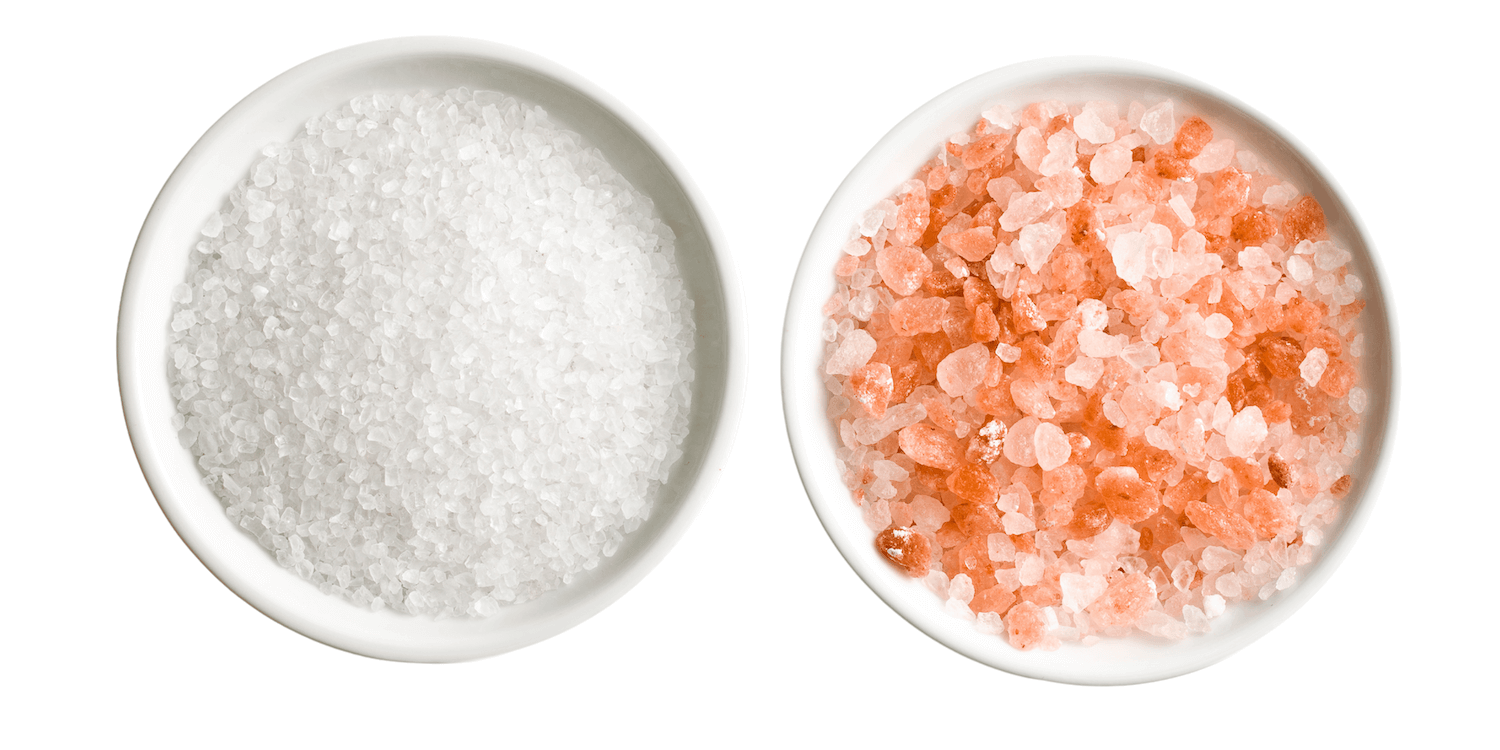
Does Himalayan Pink Salt Remineralize Water?
Himalayan pink salt oftentimes contains over 84 different trace minerals [15]. If you’re not on a low-sodium diet, adding a small pinch of pink salt in moderation to your food can increase mineral levels.
However, keep in mind that pink salt can have higher levels of lead. To learn more about the best salt brands, check out: What Are The Healthiest Salt Brands? Minerals In Salt 101.
The Best Way To Decrease Mineral Deficiency
Minerals are best absorbed from high-quality organic foods. This is the best way to prevent mineral deficiency. It is more important to get your minerals through food versus through your water.
Essential minerals are abundant in many natural food and drink sources, such as:
- Dark leafy greens
- Nuts and seeds
- Beans
- Pasture-raised eggs (look for an orange yolk)
- Wild-caught fish (in moderation)
- Avocados
- Cocoa (rich in magnesium and copper)
- Fruit (especially berries, like strawberries, blueberries, raspberries)
- Spirulina
- Quinoa
- Pasture-raised grass-fed meats (especially organ meats)
- Seaweed (for iodine)
- Coconut water (a great alternative to sugary sports drinks)
… and many, many more.
When in doubt, eat a diverse diet full of real whole organic foods.
It’s important to source organic, regeneratively-farmed produce because it is rich in minerals. Over-farmed, “dead” soil from conventional farming can lack the proper minerals needed for healthy food.
Water Mineral Drops – In Summary
Many water mineral drop supplements are marketed as being “essential,” while the reality is quite the opposite. Water is not a reliable source of trace minerals. Oftentimes “mineralized water” is mostly a marketing term. Instead of poor-quality water mineral drops, work with a qualified naturopathic physician or doctor to determine which (if any) minerals you’re deficient in. They can run proper blood-work panels to test for these deficiencies. Using high-quality, specific supplements to target those deficiencies will make more of a difference in your long-term health.
As with most things related to health, it’s all bio-individual. Will most mineral drop supplements harm you? No, probably not. But, are they necessary? Again, no, probably not. If you’re looking to add minerals back into your drinking water, a tiny pinch of Himalayan pink salt can do the trick.
Save the below image on Pinterest for future reference!
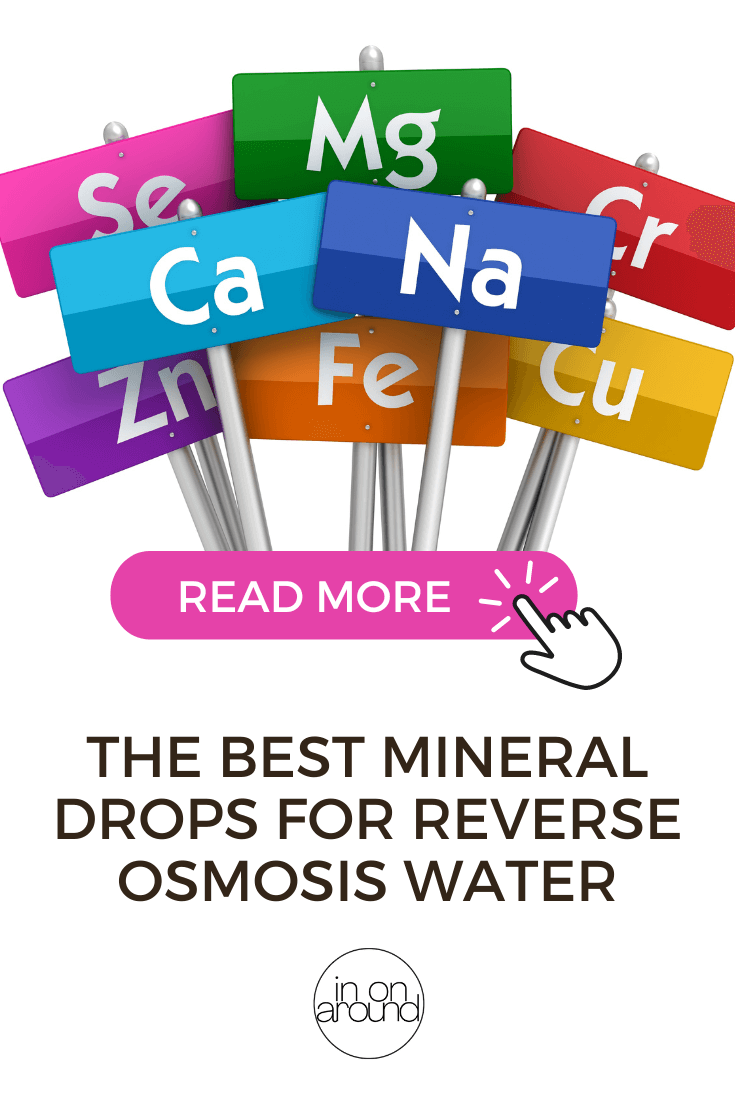
Trace Mineral Drops – Frequently Asked Questions
Click on the below FAQs to learn more about mineral drops for reverse osmosis water!
What's The Difference Between Vitamins & Minerals?
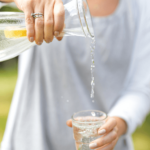
Vitamins and minerals are oftentimes mentioned together since they’re both micronutrients, however, they are distinct and different compounds. Vitamins are made by plants or animals as “organic” compounds. Minerals, on the other hand, come from soil, rock, and water (as “inorganic” compounds). Our bodies do not create these substances on our own – we need to get them from an external source.
What Causes Mineral Deficiencies?

A poor diet (one that’s full of processed junk food) is oftentimes mineral-deficient. Very restricted diets, such as keto or veganism, can also lead to significant mineral deficiencies. If your body struggles to properly digest food (like due to leaky gut, parasitic infections, food intolerances, etc…), you can also be deficient in minerals. Even certain medications can impact your absorption!
Do You Need Minerals For Proper Hydration?
Do Reverse Osmosis Water Filters Remove Minerals?

Yes, typically reverse osmosis (RO) filters remove the natural minerals found in the water. Reverse osmosis water filters are extremely high-quality filters and they remove potentially harmful contaminants, like bacteria, heavy metals, and chlorine. However, they oftentimes also remove some of the healthy naturally-occurring minerals in the liquid.
Do you add minerals back into your water?
Let me know your thoughts below in the comments! You can watch our web story here.
xoxo,

Want to read more? Check out my other articles here!
Information on Mineral Drops For Reverse Osmosis Water from: FDA, Healthline, National Geographic, Pharmacy Times, Well + Good, Health of Children
Copyright In On Around LLC 2021 ©. The statements made on this website have not been evaluated by the FDA (U.S. Food & Drug Administration). They are not intended to diagnose, treat, cure, or prevent any disease. The information provided by this website should not be used as individual medical advice and you should always consult your doctor for individual recommendations and treatment. The information contained in this site is provided on an “as is” basis. Related to this site, there are no guarantees of completeness, accuracy, usefulness, or timeliness. In On Around LLC assumes no responsibility or liability for any errors or omissions in the content of this site.



4 Responses
Great info! We’ve been using trace minerals but will stop after reading your findings!
Thank you for the support!
Great article. When you say “do not test for heavy metals” you mean the test is negative or that they don’t run a test to see if there are metals in their product?
Thank you for your support! When I say “do not test for heavy metals,” I mean that their 3rd party tests that were provided to me don’t test for specific metals. Many will test for bacteria contamination, yeast, mold, pH, salinity, calcium, magnesium levels, etc… But since it’s not always required, many won’t do additional testing on fluoride, lead, mercury, & other potentially harmful heavy metals. It depends on the brand. If they do perform that testing, sometimes they wouldn’t share it with me publicly.